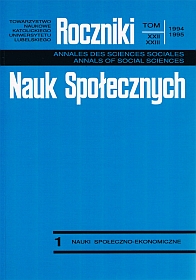Koncepcja życia społecznego klasycznego liberalizmu
Abstrakt
Classical liberalism represented, among others, by Th. Hobbes and J.J. Rousseau, explains the establishment of social life through the so-called theory of social contract. Radical individualism, nominalism and apersonal understanding of the human person undermines its ontological foundations of social character. That is why the liberal conception of social life may be defined as energetic interactionism. Social community is the place where individuals governed exclusively by private and egoistic aims encounter. The following principles are taken as the basis of social life: unrestrained freedom of the individual, free market and competition, pluralism and tolerance. The idea of the common good is wanting here or else it is understood as a group of economic values. The nature of the social character of the state is interpreted in the same manner. The state’s aim being above all: ensuring citizens’s life and security, respecting and guaranteeing their personal freedom; economic activity, political pluralism and parliamentary democracy dominate here. The laissez faire principle equals discarding the state’s interventionism, its function being reduced to the role of quasi-policeman. Classical liberalism belittles the role of natural communities, such as family and nation, though Rousseau put more value on them.
Copyright (c) 1995 Roczniki Nauk Społecznych

Utwór dostępny jest na licencji Creative Commons Uznanie autorstwa – Użycie niekomercyjne – Bez utworów zależnych 4.0 Międzynarodowe.


